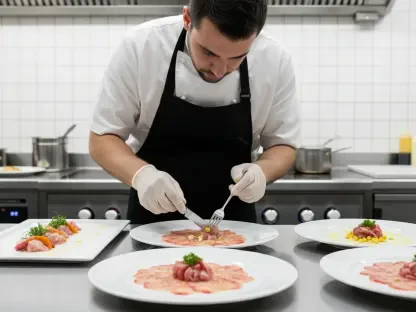In the midst of a grinding government shutdown, thousands of federal workers across the nation face unpaid bills and mounting stress, with no clear end in sight, while a staggering number of these employees—estimated at over 800,000 during similar past crises—struggle to afford basic necessities like groceries. Amid this hardship, Ruby Slipper, a New Orleans-inspired brunch chain, has stepped up with a heartfelt initiative to offer free meals to furloughed federal employees. This roundup explores diverse opinions, insights, and reactions from industry voices, community leaders, and affected workers to unpack the significance of this gesture, its broader implications for business-community relations, and how it reflects evolving trends in hospitality during national crises.
Diverse Voices on Ruby Slipper’s Initiative
Industry Perspectives on Community Support
Hospitality industry analysts have praised Ruby Slipper’s decision to provide free entrées, valued up to $20, Monday through Friday, to federal workers with valid government IDs. Many see this as a bold move that sets a benchmark for how restaurants can play a pivotal role during economic downturns. Some industry watchers note that such initiatives, while costly in the short term, often yield long-term customer loyalty and brand recognition, positioning companies as community anchors rather than mere profit-driven entities.
Others in the sector express a degree of caution, highlighting the logistical challenges of scaling such a program across 26 locations in six states. Concerns include managing potential surges in demand and ensuring fair verification of eligibility without alienating other patrons. Despite these hurdles, the consensus among industry observers leans toward admiration for balancing business operations with genuine social impact, viewing this as a model worth studying.
A contrasting angle from smaller restaurant owners within the industry suggests a mix of inspiration and apprehension. While they commend the compassion behind the offer, some worry about the pressure to match similar gestures without the resources of a larger chain. This disparity raises questions about whether only well-established brands can afford such generosity, potentially widening the gap between corporate chains and local diners.
Community Leaders Weigh In on Local Impact
Community advocates and local leaders, particularly in areas with high concentrations of federal employees, have lauded Ruby Slipper’s program as a lifeline during uncertain times. In regions near government hubs, where the shutdown’s effects are acutely felt, representatives argue that a free meal offers more than just sustenance—it provides a moment of dignity and normalcy for struggling families. This perspective underscores the emotional weight of such acts beyond their monetary value.
In some states, however, local voices point out regional differences in how the initiative resonates. For instance, in areas with fewer federal workers, the gesture might be seen as less urgent, prompting discussions on how businesses can tailor support to specific community needs. These leaders suggest that while the program is impactful, its visibility and effectiveness could vary depending on location and local economic conditions.
Additionally, grassroots organizers emphasize the ripple effect of such initiatives, noting that they often inspire other businesses to contribute in their own ways, whether through discounts or donations. This collective response, they argue, can transform a single act of kindness into a broader movement of solidarity, amplifying support for those in need and fostering stronger neighborhood ties.
Federal Workers Share Personal Reactions
Among furloughed federal employees, reactions to Ruby Slipper’s offer range from gratitude to pragmatic reflection. Many express deep appreciation for the gesture, describing how a complimentary meal alleviates the daily burden of financial strain, even if temporarily. For some, the ability to dine out without worrying about the cost restores a sense of normalcy amid personal and professional upheaval.
Others, while thankful, voice concerns about the sustainability of relying on private businesses for support during prolonged shutdowns. A segment of affected workers highlights that while the meals are a welcome relief, they do little to address deeper systemic issues like delayed paychecks or long-term financial insecurity. This viewpoint reveals a nuanced tension between immediate aid and the need for structural solutions.
A smaller but notable group sees the initiative through a lens of community connection, valuing not just the food but the message of care it conveys. Stories circulate of workers visiting Ruby Slipper locations and feeling a renewed sense of belonging, as staff and fellow diners acknowledge their plight. This emotional support, they argue, is an often-overlooked benefit of such programs, reinforcing social bonds in trying times.
Broader Implications for Hospitality and Community Engagement
Southern Hospitality as a Cultural Driver
Ruby Slipper’s roots in New Orleans have been cited by cultural commentators as a key influence behind its mission to foster connection through food. Observers note that this initiative exemplifies Southern hospitality, a tradition of warmth and generosity that shapes the brand’s identity. Many believe this cultural foundation sets Ruby Slipper apart, turning a business practice into a statement of values that resonates deeply with patrons across different states.
Regional variations in reception, however, spark debate. In Southern states, the gesture aligns seamlessly with local expectations of neighborly support, while in other areas, it might be viewed more as a novel or promotional effort. Some cultural analysts suggest that expanding such programs in the future could require adapting to diverse regional attitudes, ensuring the spirit of hospitality translates effectively everywhere.
The discussion also touches on whether restaurants should prioritize profit over purpose. Proponents of Ruby Slipper’s approach argue that blending cultural identity with social responsibility challenges this assumption, proving that businesses can thrive while serving as community pillars. This perspective encourages a reevaluation of how hospitality can drive societal good without sacrificing financial stability.
Inspiring Industry-Wide Shifts
Comparing Ruby Slipper’s response to other businesses during crises reveals a spectrum of approaches, from minimal involvement to comprehensive aid programs. Industry roundtables suggest that while some companies offer limited discounts, few match the scale of providing free meals across multiple locations. This contrast prompts speculation on whether such bold moves could inspire a shift toward community-focused models in the hospitality sector.
Recognition of Ruby Slipper as one of America’s top breakfast chains, securing a high ranking in recent national surveys, adds weight to this potential influence. Analysts argue that visible success paired with goodwill creates a compelling case for others to follow suit, possibly integrating crisis-response initiatives into core business strategies. This could redefine competitive edges in the industry, prioritizing social impact alongside revenue.
A forward-looking viewpoint emphasizes the role of technology in scaling such efforts, with tools like loyalty apps enhancing customer engagement during outreach programs. Observers note that combining digital platforms with on-the-ground support could set a new standard, making it easier for businesses of all sizes to contribute meaningfully during national hardships.
Reflecting on a Gesture of Solidarity
Looking back, the varied perspectives on Ruby Slipper’s free meal program for furloughed federal workers paint a rich tapestry of admiration, caution, and hope. Industry experts celebrated the initiative as a benchmark for hospitality’s role in crises, while community leaders highlighted its localized impact and emotional resonance. Federal workers themselves offered a grounded view, balancing gratitude with calls for broader solutions, reflecting the complexity of addressing systemic challenges through individual acts of kindness.
Moving forward, businesses inspired by this example might consider embedding community support into their operational ethos, starting with small, sustainable gestures that build trust over time. Exploring partnerships with local organizations could amplify impact, ensuring aid reaches those most in need. For communities, supporting establishments that prioritize social good—whether through patronage or advocacy—remains a practical step to sustain such efforts, fostering a cycle of care that strengthens societal resilience against future uncertainties.









